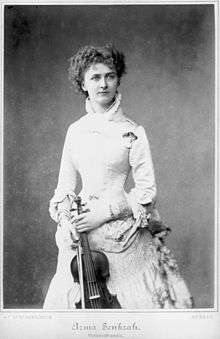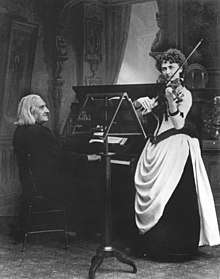Arma Senkrah
Arma Senkrah, birthname Anna Loretta Harkness, (1864–1900) was an American violinist who won a Guadagnini violin as first prize at the Conservatoire de Paris in 1881. She collaborated and performed with Franz Liszt. After many successful appearances across Europe, she married a Weimar lawyer in 1888 and stopped performing. In 1900, she committed suicide.[1][2][3]


Biography
Born in Williamson, New York, on 6 June 1864, Anna Loretta Harkness was introduced to the violin by her mother. When she was nine, she went to Europe where she studied under Arno Hilf in Leipzig and Henryk Wieniawski in Brussels. In 1875 she entered the Paris Conservatoire to study under Joseph Lambert Massart. She received a Guadagini violin inscribed with her name as the Conservoire's first prize in 1881 when she was just 17.[1][2]
Thereafter she toured throughout Europe, performing at London's Crystal Palace in 1882, in Leipzig in 1883 and in Berlin in 1884. It was around this time that on the advice of her agent she changed her name to Senkrah (Harkness written backwards). In 1885, she performed with Franz Liszt and associated with his pupils. When in Russia in 1886, she met Tchaikovsky.[1][2]
On 3 September 1900, after two years of marriage to a Weimar lawyer by the name of Hoffmann, she shot herself with a revolver, possibly as a result of a brain disorder.[1][4]
References
- "Arma Senkrah". Prone to Violins. 21 July 2013. Retrieved 22 December 2019.
- "Arma Senkrah" (PDF). Maestronet: Violins and Violinists. December 1943. Retrieved 22 December 2019.
- "Great Female Violinists: A List". Song of the Lark. 23 August 2011. Retrieved 22 December 2019.
- "American Violinist Kills Herself in Germany". New York Times. 5 September 1900. Retrieved 22 December 2019.